An Analysis of Supporting Independent Living in Health and Social Care
VerifiedAdded on 2020/12/09
|13
|5024
|168
Report
AI Summary
This report explores the increasing use of assistive technology to support independent living in health and social care settings. It begins with an introduction to various assistive technologies and their benefits for individuals with disabilities or conditions like dementia, enabling them to live independently. The report then analyzes the barriers to the adoption of these technologies, such as budget constraints, lack of funding, and resistance to change, as well as the benefits for both service users and healthcare organizations. It further discusses health and safety considerations, emphasizing the importance of staff training, safe installation, and reliable devices. The report concludes with two case studies, illustrating the practical application of these technologies. The report highlights the importance of assistive technology in enabling individuals to live independently and the need for careful consideration of both the advantages and potential drawbacks associated with their use.

SUPPORTING INDEPENDENT
LIVING IN HEALTH AND SOCIAL
CARE
LIVING IN HEALTH AND SOCIAL
CARE
Paraphrase This Document
Need a fresh take? Get an instant paraphrase of this document with our AI Paraphraser
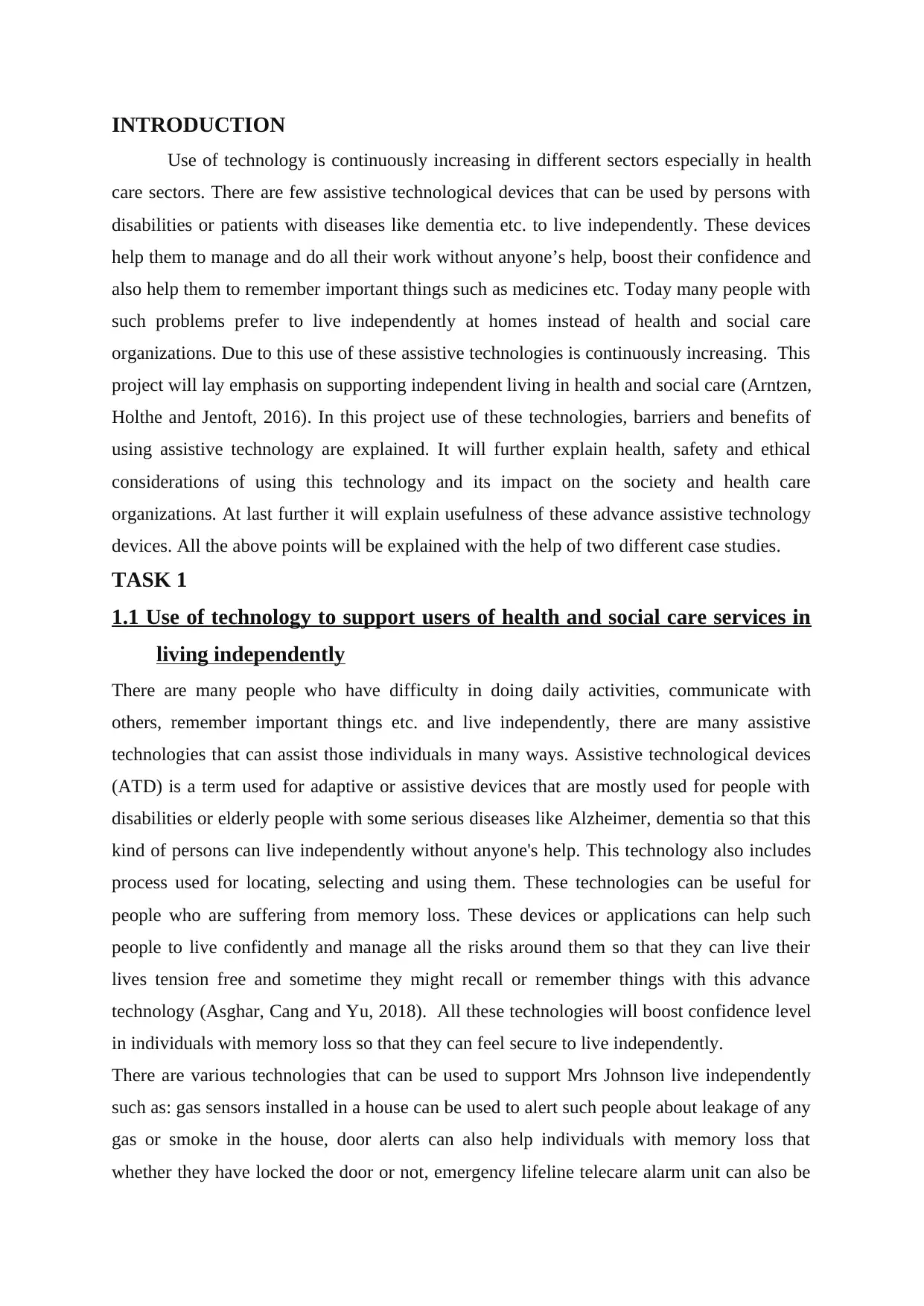
INTRODUCTION
Use of technology is continuously increasing in different sectors especially in health
care sectors. There are few assistive technological devices that can be used by persons with
disabilities or patients with diseases like dementia etc. to live independently. These devices
help them to manage and do all their work without anyone’s help, boost their confidence and
also help them to remember important things such as medicines etc. Today many people with
such problems prefer to live independently at homes instead of health and social care
organizations. Due to this use of these assistive technologies is continuously increasing. This
project will lay emphasis on supporting independent living in health and social care (Arntzen,
Holthe and Jentoft, 2016). In this project use of these technologies, barriers and benefits of
using assistive technology are explained. It will further explain health, safety and ethical
considerations of using this technology and its impact on the society and health care
organizations. At last further it will explain usefulness of these advance assistive technology
devices. All the above points will be explained with the help of two different case studies.
TASK 1
1.1 Use of technology to support users of health and social care services in
living independently
There are many people who have difficulty in doing daily activities, communicate with
others, remember important things etc. and live independently, there are many assistive
technologies that can assist those individuals in many ways. Assistive technological devices
(ATD) is a term used for adaptive or assistive devices that are mostly used for people with
disabilities or elderly people with some serious diseases like Alzheimer, dementia so that this
kind of persons can live independently without anyone's help. This technology also includes
process used for locating, selecting and using them. These technologies can be useful for
people who are suffering from memory loss. These devices or applications can help such
people to live confidently and manage all the risks around them so that they can live their
lives tension free and sometime they might recall or remember things with this advance
technology (Asghar, Cang and Yu, 2018). All these technologies will boost confidence level
in individuals with memory loss so that they can feel secure to live independently.
There are various technologies that can be used to support Mrs Johnson live independently
such as: gas sensors installed in a house can be used to alert such people about leakage of any
gas or smoke in the house, door alerts can also help individuals with memory loss that
whether they have locked the door or not, emergency lifeline telecare alarm unit can also be
Use of technology is continuously increasing in different sectors especially in health
care sectors. There are few assistive technological devices that can be used by persons with
disabilities or patients with diseases like dementia etc. to live independently. These devices
help them to manage and do all their work without anyone’s help, boost their confidence and
also help them to remember important things such as medicines etc. Today many people with
such problems prefer to live independently at homes instead of health and social care
organizations. Due to this use of these assistive technologies is continuously increasing. This
project will lay emphasis on supporting independent living in health and social care (Arntzen,
Holthe and Jentoft, 2016). In this project use of these technologies, barriers and benefits of
using assistive technology are explained. It will further explain health, safety and ethical
considerations of using this technology and its impact on the society and health care
organizations. At last further it will explain usefulness of these advance assistive technology
devices. All the above points will be explained with the help of two different case studies.
TASK 1
1.1 Use of technology to support users of health and social care services in
living independently
There are many people who have difficulty in doing daily activities, communicate with
others, remember important things etc. and live independently, there are many assistive
technologies that can assist those individuals in many ways. Assistive technological devices
(ATD) is a term used for adaptive or assistive devices that are mostly used for people with
disabilities or elderly people with some serious diseases like Alzheimer, dementia so that this
kind of persons can live independently without anyone's help. This technology also includes
process used for locating, selecting and using them. These technologies can be useful for
people who are suffering from memory loss. These devices or applications can help such
people to live confidently and manage all the risks around them so that they can live their
lives tension free and sometime they might recall or remember things with this advance
technology (Asghar, Cang and Yu, 2018). All these technologies will boost confidence level
in individuals with memory loss so that they can feel secure to live independently.
There are various technologies that can be used to support Mrs Johnson live independently
such as: gas sensors installed in a house can be used to alert such people about leakage of any
gas or smoke in the house, door alerts can also help individuals with memory loss that
whether they have locked the door or not, emergency lifeline telecare alarm unit can also be
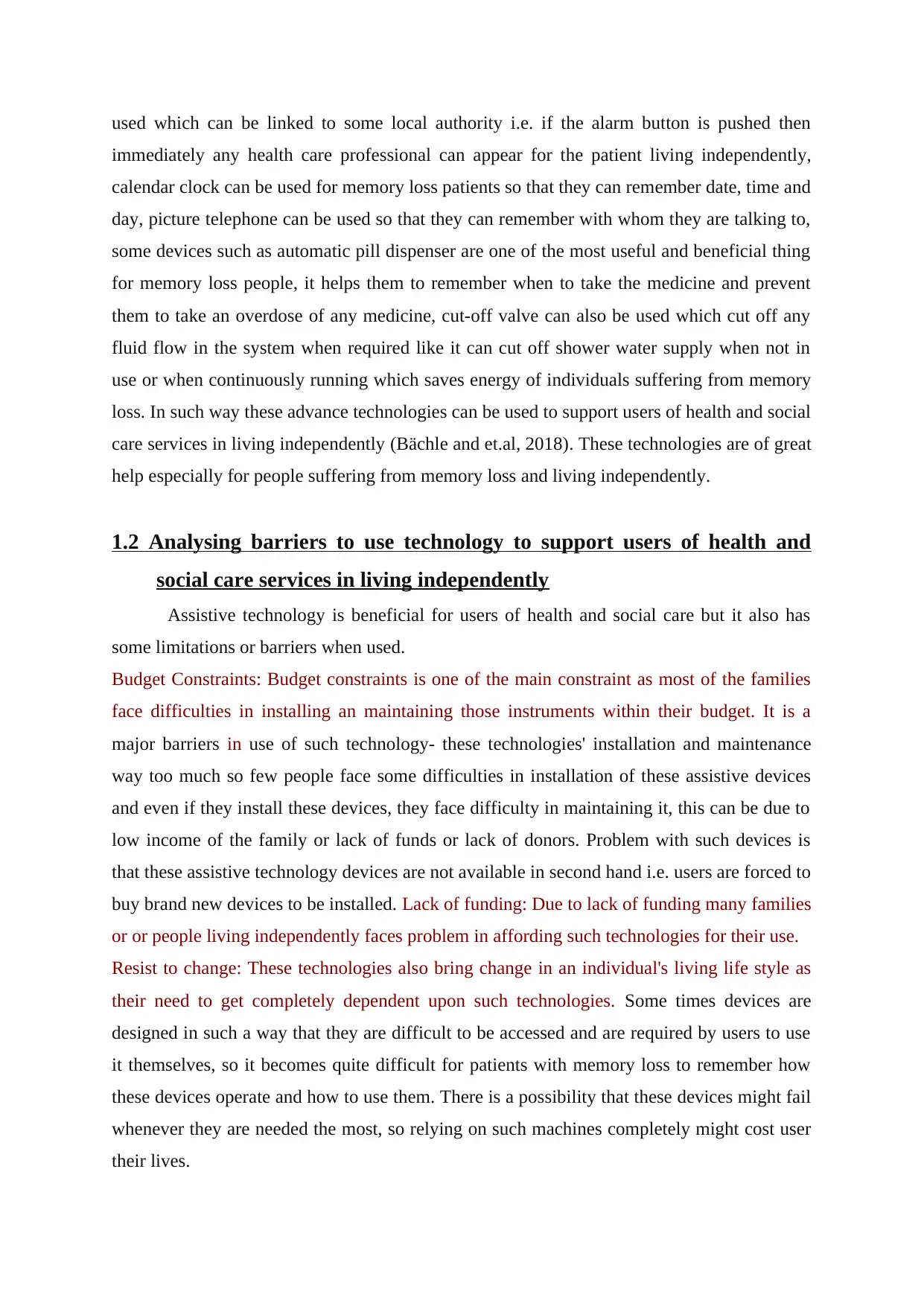
used which can be linked to some local authority i.e. if the alarm button is pushed then
immediately any health care professional can appear for the patient living independently,
calendar clock can be used for memory loss patients so that they can remember date, time and
day, picture telephone can be used so that they can remember with whom they are talking to,
some devices such as automatic pill dispenser are one of the most useful and beneficial thing
for memory loss people, it helps them to remember when to take the medicine and prevent
them to take an overdose of any medicine, cut-off valve can also be used which cut off any
fluid flow in the system when required like it can cut off shower water supply when not in
use or when continuously running which saves energy of individuals suffering from memory
loss. In such way these advance technologies can be used to support users of health and social
care services in living independently (Bächle and et.al, 2018). These technologies are of great
help especially for people suffering from memory loss and living independently.
1.2 Analysing barriers to use technology to support users of health and
social care services in living independently
Assistive technology is beneficial for users of health and social care but it also has
some limitations or barriers when used.
Budget Constraints: Budget constraints is one of the main constraint as most of the families
face difficulties in installing an maintaining those instruments within their budget. It is a
major barriers in use of such technology- these technologies' installation and maintenance
way too much so few people face some difficulties in installation of these assistive devices
and even if they install these devices, they face difficulty in maintaining it, this can be due to
low income of the family or lack of funds or lack of donors. Problem with such devices is
that these assistive technology devices are not available in second hand i.e. users are forced to
buy brand new devices to be installed. Lack of funding: Due to lack of funding many families
or or people living independently faces problem in affording such technologies for their use.
Resist to change: These technologies also bring change in an individual's living life style as
their need to get completely dependent upon such technologies. Some times devices are
designed in such a way that they are difficult to be accessed and are required by users to use
it themselves, so it becomes quite difficult for patients with memory loss to remember how
these devices operate and how to use them. There is a possibility that these devices might fail
whenever they are needed the most, so relying on such machines completely might cost user
their lives.
immediately any health care professional can appear for the patient living independently,
calendar clock can be used for memory loss patients so that they can remember date, time and
day, picture telephone can be used so that they can remember with whom they are talking to,
some devices such as automatic pill dispenser are one of the most useful and beneficial thing
for memory loss people, it helps them to remember when to take the medicine and prevent
them to take an overdose of any medicine, cut-off valve can also be used which cut off any
fluid flow in the system when required like it can cut off shower water supply when not in
use or when continuously running which saves energy of individuals suffering from memory
loss. In such way these advance technologies can be used to support users of health and social
care services in living independently (Bächle and et.al, 2018). These technologies are of great
help especially for people suffering from memory loss and living independently.
1.2 Analysing barriers to use technology to support users of health and
social care services in living independently
Assistive technology is beneficial for users of health and social care but it also has
some limitations or barriers when used.
Budget Constraints: Budget constraints is one of the main constraint as most of the families
face difficulties in installing an maintaining those instruments within their budget. It is a
major barriers in use of such technology- these technologies' installation and maintenance
way too much so few people face some difficulties in installation of these assistive devices
and even if they install these devices, they face difficulty in maintaining it, this can be due to
low income of the family or lack of funds or lack of donors. Problem with such devices is
that these assistive technology devices are not available in second hand i.e. users are forced to
buy brand new devices to be installed. Lack of funding: Due to lack of funding many families
or or people living independently faces problem in affording such technologies for their use.
Resist to change: These technologies also bring change in an individual's living life style as
their need to get completely dependent upon such technologies. Some times devices are
designed in such a way that they are difficult to be accessed and are required by users to use
it themselves, so it becomes quite difficult for patients with memory loss to remember how
these devices operate and how to use them. There is a possibility that these devices might fail
whenever they are needed the most, so relying on such machines completely might cost user
their lives.
⊘ This is a preview!⊘
Do you want full access?
Subscribe today to unlock all pages.

Trusted by 1+ million students worldwide
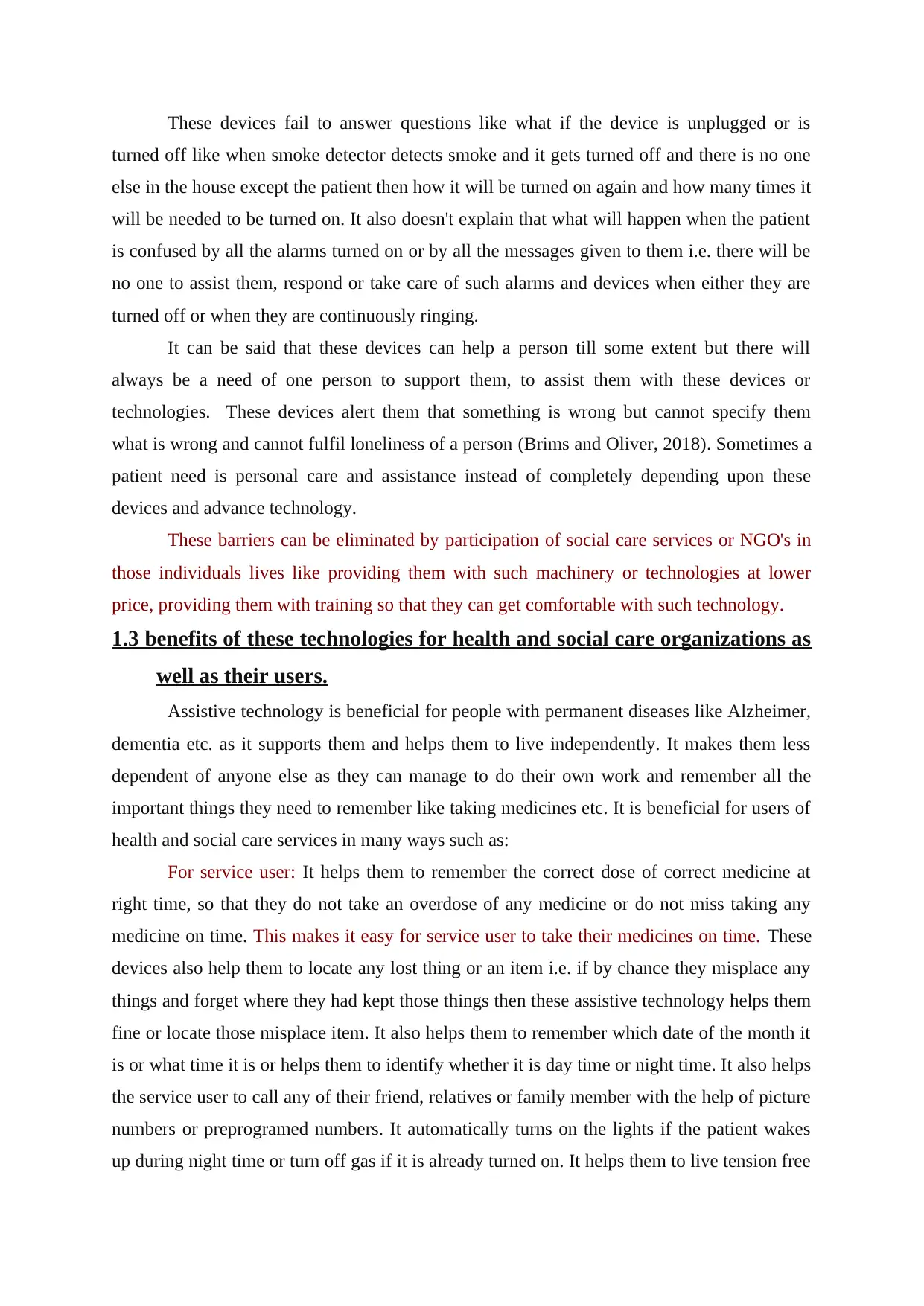
These devices fail to answer questions like what if the device is unplugged or is
turned off like when smoke detector detects smoke and it gets turned off and there is no one
else in the house except the patient then how it will be turned on again and how many times it
will be needed to be turned on. It also doesn't explain that what will happen when the patient
is confused by all the alarms turned on or by all the messages given to them i.e. there will be
no one to assist them, respond or take care of such alarms and devices when either they are
turned off or when they are continuously ringing.
It can be said that these devices can help a person till some extent but there will
always be a need of one person to support them, to assist them with these devices or
technologies. These devices alert them that something is wrong but cannot specify them
what is wrong and cannot fulfil loneliness of a person (Brims and Oliver, 2018). Sometimes a
patient need is personal care and assistance instead of completely depending upon these
devices and advance technology.
These barriers can be eliminated by participation of social care services or NGO's in
those individuals lives like providing them with such machinery or technologies at lower
price, providing them with training so that they can get comfortable with such technology.
1.3 benefits of these technologies for health and social care organizations as
well as their users.
Assistive technology is beneficial for people with permanent diseases like Alzheimer,
dementia etc. as it supports them and helps them to live independently. It makes them less
dependent of anyone else as they can manage to do their own work and remember all the
important things they need to remember like taking medicines etc. It is beneficial for users of
health and social care services in many ways such as:
For service user: It helps them to remember the correct dose of correct medicine at
right time, so that they do not take an overdose of any medicine or do not miss taking any
medicine on time. This makes it easy for service user to take their medicines on time. These
devices also help them to locate any lost thing or an item i.e. if by chance they misplace any
things and forget where they had kept those things then these assistive technology helps them
fine or locate those misplace item. It also helps them to remember which date of the month it
is or what time it is or helps them to identify whether it is day time or night time. It also helps
the service user to call any of their friend, relatives or family member with the help of picture
numbers or preprogramed numbers. It automatically turns on the lights if the patient wakes
up during night time or turn off gas if it is already turned on. It helps them to live tension free
turned off like when smoke detector detects smoke and it gets turned off and there is no one
else in the house except the patient then how it will be turned on again and how many times it
will be needed to be turned on. It also doesn't explain that what will happen when the patient
is confused by all the alarms turned on or by all the messages given to them i.e. there will be
no one to assist them, respond or take care of such alarms and devices when either they are
turned off or when they are continuously ringing.
It can be said that these devices can help a person till some extent but there will
always be a need of one person to support them, to assist them with these devices or
technologies. These devices alert them that something is wrong but cannot specify them
what is wrong and cannot fulfil loneliness of a person (Brims and Oliver, 2018). Sometimes a
patient need is personal care and assistance instead of completely depending upon these
devices and advance technology.
These barriers can be eliminated by participation of social care services or NGO's in
those individuals lives like providing them with such machinery or technologies at lower
price, providing them with training so that they can get comfortable with such technology.
1.3 benefits of these technologies for health and social care organizations as
well as their users.
Assistive technology is beneficial for people with permanent diseases like Alzheimer,
dementia etc. as it supports them and helps them to live independently. It makes them less
dependent of anyone else as they can manage to do their own work and remember all the
important things they need to remember like taking medicines etc. It is beneficial for users of
health and social care services in many ways such as:
For service user: It helps them to remember the correct dose of correct medicine at
right time, so that they do not take an overdose of any medicine or do not miss taking any
medicine on time. This makes it easy for service user to take their medicines on time. These
devices also help them to locate any lost thing or an item i.e. if by chance they misplace any
things and forget where they had kept those things then these assistive technology helps them
fine or locate those misplace item. It also helps them to remember which date of the month it
is or what time it is or helps them to identify whether it is day time or night time. It also helps
the service user to call any of their friend, relatives or family member with the help of picture
numbers or preprogramed numbers. It automatically turns on the lights if the patient wakes
up during night time or turn off gas if it is already turned on. It helps them to live tension free
Paraphrase This Document
Need a fresh take? Get an instant paraphrase of this document with our AI Paraphraser
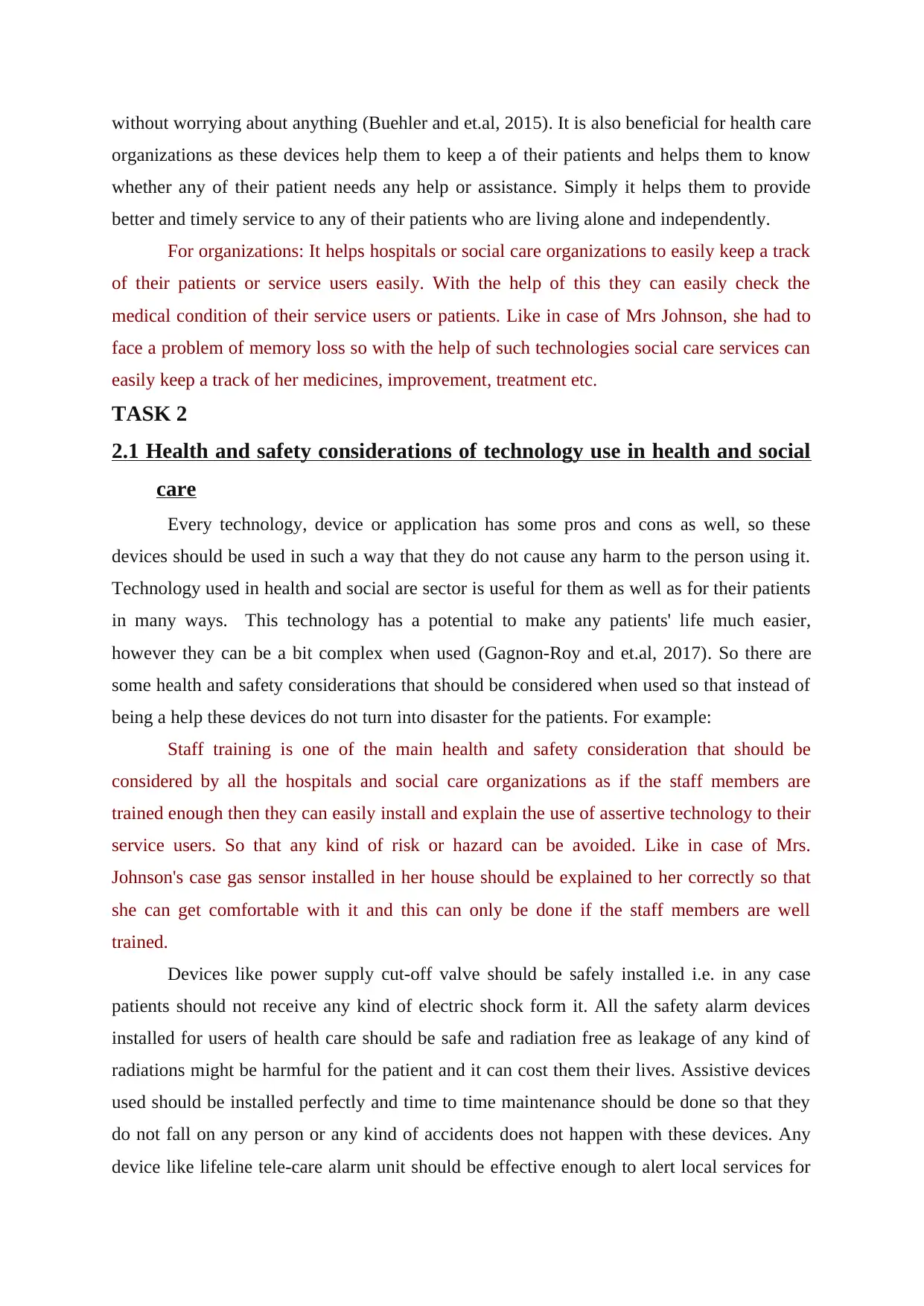
without worrying about anything (Buehler and et.al, 2015). It is also beneficial for health care
organizations as these devices help them to keep a of their patients and helps them to know
whether any of their patient needs any help or assistance. Simply it helps them to provide
better and timely service to any of their patients who are living alone and independently.
For organizations: It helps hospitals or social care organizations to easily keep a track
of their patients or service users easily. With the help of this they can easily check the
medical condition of their service users or patients. Like in case of Mrs Johnson, she had to
face a problem of memory loss so with the help of such technologies social care services can
easily keep a track of her medicines, improvement, treatment etc.
TASK 2
2.1 Health and safety considerations of technology use in health and social
care
Every technology, device or application has some pros and cons as well, so these
devices should be used in such a way that they do not cause any harm to the person using it.
Technology used in health and social are sector is useful for them as well as for their patients
in many ways. This technology has a potential to make any patients' life much easier,
however they can be a bit complex when used (Gagnon-Roy and et.al, 2017). So there are
some health and safety considerations that should be considered when used so that instead of
being a help these devices do not turn into disaster for the patients. For example:
Staff training is one of the main health and safety consideration that should be
considered by all the hospitals and social care organizations as if the staff members are
trained enough then they can easily install and explain the use of assertive technology to their
service users. So that any kind of risk or hazard can be avoided. Like in case of Mrs.
Johnson's case gas sensor installed in her house should be explained to her correctly so that
she can get comfortable with it and this can only be done if the staff members are well
trained.
Devices like power supply cut-off valve should be safely installed i.e. in any case
patients should not receive any kind of electric shock form it. All the safety alarm devices
installed for users of health care should be safe and radiation free as leakage of any kind of
radiations might be harmful for the patient and it can cost them their lives. Assistive devices
used should be installed perfectly and time to time maintenance should be done so that they
do not fall on any person or any kind of accidents does not happen with these devices. Any
device like lifeline tele-care alarm unit should be effective enough to alert local services for
organizations as these devices help them to keep a of their patients and helps them to know
whether any of their patient needs any help or assistance. Simply it helps them to provide
better and timely service to any of their patients who are living alone and independently.
For organizations: It helps hospitals or social care organizations to easily keep a track
of their patients or service users easily. With the help of this they can easily check the
medical condition of their service users or patients. Like in case of Mrs Johnson, she had to
face a problem of memory loss so with the help of such technologies social care services can
easily keep a track of her medicines, improvement, treatment etc.
TASK 2
2.1 Health and safety considerations of technology use in health and social
care
Every technology, device or application has some pros and cons as well, so these
devices should be used in such a way that they do not cause any harm to the person using it.
Technology used in health and social are sector is useful for them as well as for their patients
in many ways. This technology has a potential to make any patients' life much easier,
however they can be a bit complex when used (Gagnon-Roy and et.al, 2017). So there are
some health and safety considerations that should be considered when used so that instead of
being a help these devices do not turn into disaster for the patients. For example:
Staff training is one of the main health and safety consideration that should be
considered by all the hospitals and social care organizations as if the staff members are
trained enough then they can easily install and explain the use of assertive technology to their
service users. So that any kind of risk or hazard can be avoided. Like in case of Mrs.
Johnson's case gas sensor installed in her house should be explained to her correctly so that
she can get comfortable with it and this can only be done if the staff members are well
trained.
Devices like power supply cut-off valve should be safely installed i.e. in any case
patients should not receive any kind of electric shock form it. All the safety alarm devices
installed for users of health care should be safe and radiation free as leakage of any kind of
radiations might be harmful for the patient and it can cost them their lives. Assistive devices
used should be installed perfectly and time to time maintenance should be done so that they
do not fall on any person or any kind of accidents does not happen with these devices. Any
device like lifeline tele-care alarm unit should be effective enough to alert local services for
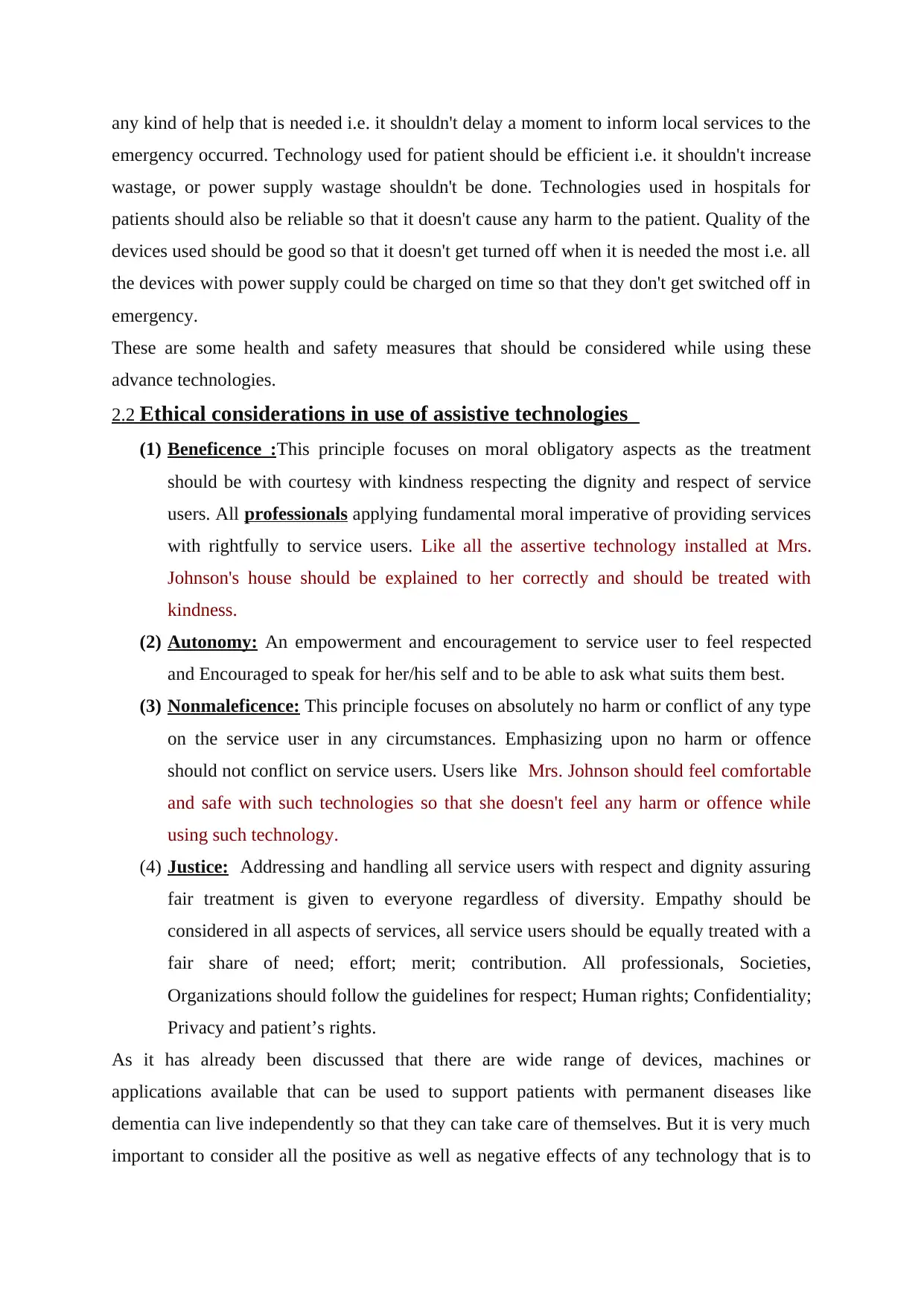
any kind of help that is needed i.e. it shouldn't delay a moment to inform local services to the
emergency occurred. Technology used for patient should be efficient i.e. it shouldn't increase
wastage, or power supply wastage shouldn't be done. Technologies used in hospitals for
patients should also be reliable so that it doesn't cause any harm to the patient. Quality of the
devices used should be good so that it doesn't get turned off when it is needed the most i.e. all
the devices with power supply could be charged on time so that they don't get switched off in
emergency.
These are some health and safety measures that should be considered while using these
advance technologies.
2.2 Ethical considerations in use of assistive technologies
(1) Beneficence :This principle focuses on moral obligatory aspects as the treatment
should be with courtesy with kindness respecting the dignity and respect of service
users. All professionals applying fundamental moral imperative of providing services
with rightfully to service users. Like all the assertive technology installed at Mrs.
Johnson's house should be explained to her correctly and should be treated with
kindness.
(2) Autonomy: An empowerment and encouragement to service user to feel respected
and Encouraged to speak for her/his self and to be able to ask what suits them best.
(3) Nonmaleficence: This principle focuses on absolutely no harm or conflict of any type
on the service user in any circumstances. Emphasizing upon no harm or offence
should not conflict on service users. Users like Mrs. Johnson should feel comfortable
and safe with such technologies so that she doesn't feel any harm or offence while
using such technology.
(4) Justice: Addressing and handling all service users with respect and dignity assuring
fair treatment is given to everyone regardless of diversity. Empathy should be
considered in all aspects of services, all service users should be equally treated with a
fair share of need; effort; merit; contribution. All professionals, Societies,
Organizations should follow the guidelines for respect; Human rights; Confidentiality;
Privacy and patient’s rights.
As it has already been discussed that there are wide range of devices, machines or
applications available that can be used to support patients with permanent diseases like
dementia can live independently so that they can take care of themselves. But it is very much
important to consider all the positive as well as negative effects of any technology that is to
emergency occurred. Technology used for patient should be efficient i.e. it shouldn't increase
wastage, or power supply wastage shouldn't be done. Technologies used in hospitals for
patients should also be reliable so that it doesn't cause any harm to the patient. Quality of the
devices used should be good so that it doesn't get turned off when it is needed the most i.e. all
the devices with power supply could be charged on time so that they don't get switched off in
emergency.
These are some health and safety measures that should be considered while using these
advance technologies.
2.2 Ethical considerations in use of assistive technologies
(1) Beneficence :This principle focuses on moral obligatory aspects as the treatment
should be with courtesy with kindness respecting the dignity and respect of service
users. All professionals applying fundamental moral imperative of providing services
with rightfully to service users. Like all the assertive technology installed at Mrs.
Johnson's house should be explained to her correctly and should be treated with
kindness.
(2) Autonomy: An empowerment and encouragement to service user to feel respected
and Encouraged to speak for her/his self and to be able to ask what suits them best.
(3) Nonmaleficence: This principle focuses on absolutely no harm or conflict of any type
on the service user in any circumstances. Emphasizing upon no harm or offence
should not conflict on service users. Users like Mrs. Johnson should feel comfortable
and safe with such technologies so that she doesn't feel any harm or offence while
using such technology.
(4) Justice: Addressing and handling all service users with respect and dignity assuring
fair treatment is given to everyone regardless of diversity. Empathy should be
considered in all aspects of services, all service users should be equally treated with a
fair share of need; effort; merit; contribution. All professionals, Societies,
Organizations should follow the guidelines for respect; Human rights; Confidentiality;
Privacy and patient’s rights.
As it has already been discussed that there are wide range of devices, machines or
applications available that can be used to support patients with permanent diseases like
dementia can live independently so that they can take care of themselves. But it is very much
important to consider all the positive as well as negative effects of any technology that is to
⊘ This is a preview!⊘
Do you want full access?
Subscribe today to unlock all pages.

Trusted by 1+ million students worldwide
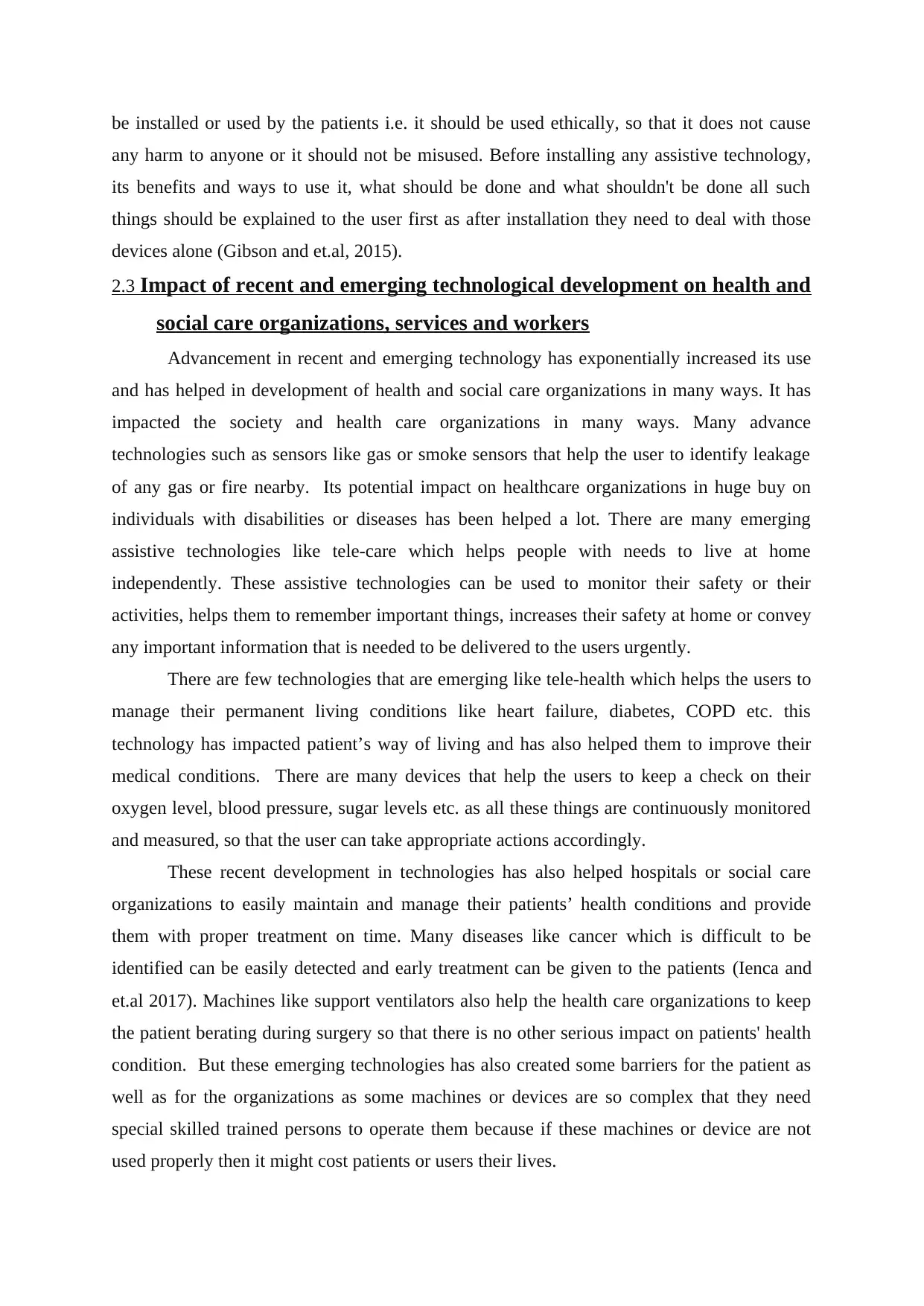
be installed or used by the patients i.e. it should be used ethically, so that it does not cause
any harm to anyone or it should not be misused. Before installing any assistive technology,
its benefits and ways to use it, what should be done and what shouldn't be done all such
things should be explained to the user first as after installation they need to deal with those
devices alone (Gibson and et.al, 2015).
2.3 Impact of recent and emerging technological development on health and
social care organizations, services and workers
Advancement in recent and emerging technology has exponentially increased its use
and has helped in development of health and social care organizations in many ways. It has
impacted the society and health care organizations in many ways. Many advance
technologies such as sensors like gas or smoke sensors that help the user to identify leakage
of any gas or fire nearby. Its potential impact on healthcare organizations in huge buy on
individuals with disabilities or diseases has been helped a lot. There are many emerging
assistive technologies like tele-care which helps people with needs to live at home
independently. These assistive technologies can be used to monitor their safety or their
activities, helps them to remember important things, increases their safety at home or convey
any important information that is needed to be delivered to the users urgently.
There are few technologies that are emerging like tele-health which helps the users to
manage their permanent living conditions like heart failure, diabetes, COPD etc. this
technology has impacted patient’s way of living and has also helped them to improve their
medical conditions. There are many devices that help the users to keep a check on their
oxygen level, blood pressure, sugar levels etc. as all these things are continuously monitored
and measured, so that the user can take appropriate actions accordingly.
These recent development in technologies has also helped hospitals or social care
organizations to easily maintain and manage their patients’ health conditions and provide
them with proper treatment on time. Many diseases like cancer which is difficult to be
identified can be easily detected and early treatment can be given to the patients (Ienca and
et.al 2017). Machines like support ventilators also help the health care organizations to keep
the patient berating during surgery so that there is no other serious impact on patients' health
condition. But these emerging technologies has also created some barriers for the patient as
well as for the organizations as some machines or devices are so complex that they need
special skilled trained persons to operate them because if these machines or device are not
used properly then it might cost patients or users their lives.
any harm to anyone or it should not be misused. Before installing any assistive technology,
its benefits and ways to use it, what should be done and what shouldn't be done all such
things should be explained to the user first as after installation they need to deal with those
devices alone (Gibson and et.al, 2015).
2.3 Impact of recent and emerging technological development on health and
social care organizations, services and workers
Advancement in recent and emerging technology has exponentially increased its use
and has helped in development of health and social care organizations in many ways. It has
impacted the society and health care organizations in many ways. Many advance
technologies such as sensors like gas or smoke sensors that help the user to identify leakage
of any gas or fire nearby. Its potential impact on healthcare organizations in huge buy on
individuals with disabilities or diseases has been helped a lot. There are many emerging
assistive technologies like tele-care which helps people with needs to live at home
independently. These assistive technologies can be used to monitor their safety or their
activities, helps them to remember important things, increases their safety at home or convey
any important information that is needed to be delivered to the users urgently.
There are few technologies that are emerging like tele-health which helps the users to
manage their permanent living conditions like heart failure, diabetes, COPD etc. this
technology has impacted patient’s way of living and has also helped them to improve their
medical conditions. There are many devices that help the users to keep a check on their
oxygen level, blood pressure, sugar levels etc. as all these things are continuously monitored
and measured, so that the user can take appropriate actions accordingly.
These recent development in technologies has also helped hospitals or social care
organizations to easily maintain and manage their patients’ health conditions and provide
them with proper treatment on time. Many diseases like cancer which is difficult to be
identified can be easily detected and early treatment can be given to the patients (Ienca and
et.al 2017). Machines like support ventilators also help the health care organizations to keep
the patient berating during surgery so that there is no other serious impact on patients' health
condition. But these emerging technologies has also created some barriers for the patient as
well as for the organizations as some machines or devices are so complex that they need
special skilled trained persons to operate them because if these machines or device are not
used properly then it might cost patients or users their lives.
Paraphrase This Document
Need a fresh take? Get an instant paraphrase of this document with our AI Paraphraser
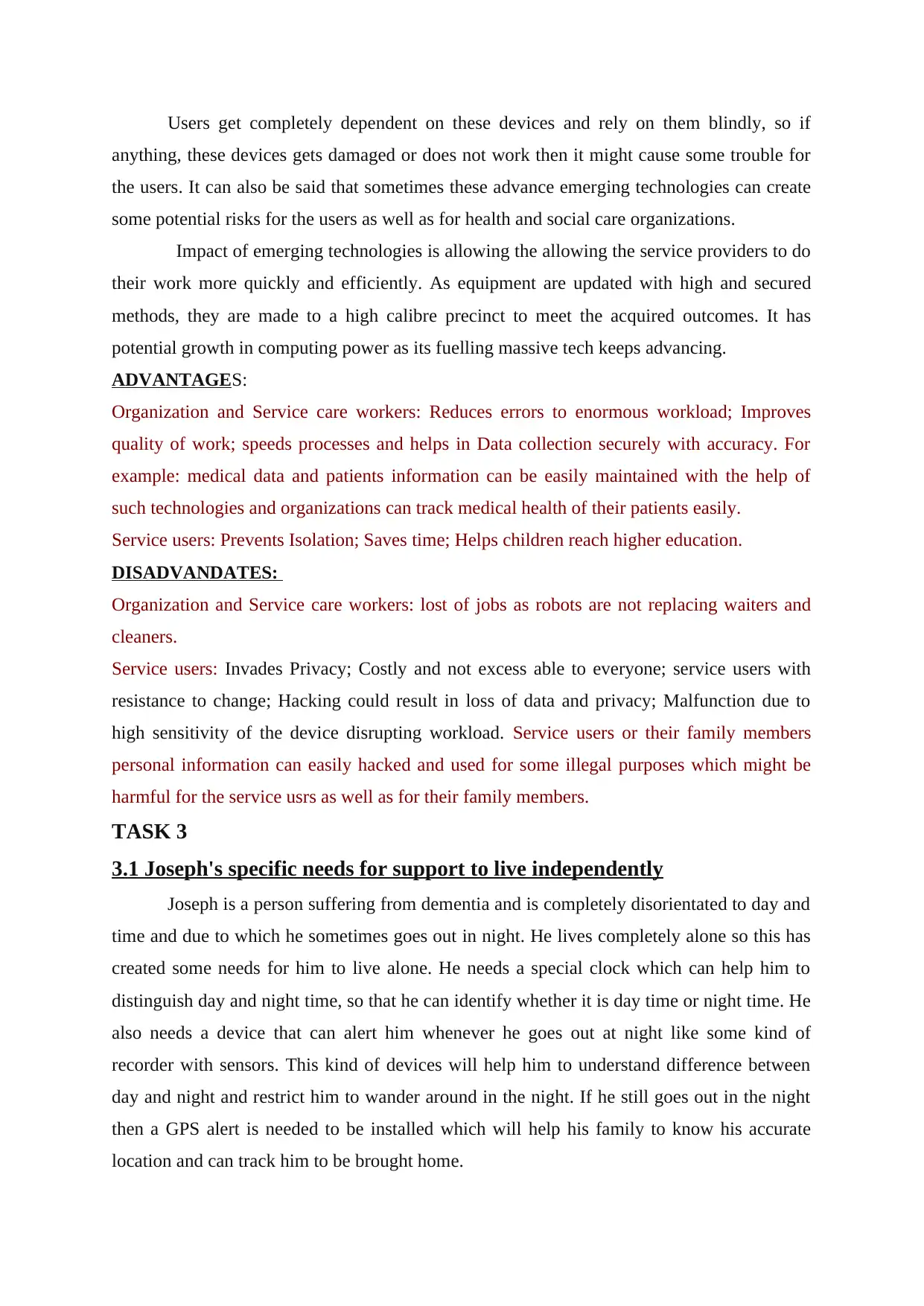
Users get completely dependent on these devices and rely on them blindly, so if
anything, these devices gets damaged or does not work then it might cause some trouble for
the users. It can also be said that sometimes these advance emerging technologies can create
some potential risks for the users as well as for health and social care organizations.
Impact of emerging technologies is allowing the allowing the service providers to do
their work more quickly and efficiently. As equipment are updated with high and secured
methods, they are made to a high calibre precinct to meet the acquired outcomes. It has
potential growth in computing power as its fuelling massive tech keeps advancing.
ADVANTAGES:
Organization and Service care workers: Reduces errors to enormous workload; Improves
quality of work; speeds processes and helps in Data collection securely with accuracy. For
example: medical data and patients information can be easily maintained with the help of
such technologies and organizations can track medical health of their patients easily.
Service users: Prevents Isolation; Saves time; Helps children reach higher education.
DISADVANDATES:
Organization and Service care workers: lost of jobs as robots are not replacing waiters and
cleaners.
Service users: Invades Privacy; Costly and not excess able to everyone; service users with
resistance to change; Hacking could result in loss of data and privacy; Malfunction due to
high sensitivity of the device disrupting workload. Service users or their family members
personal information can easily hacked and used for some illegal purposes which might be
harmful for the service usrs as well as for their family members.
TASK 3
3.1 Joseph's specific needs for support to live independently
Joseph is a person suffering from dementia and is completely disorientated to day and
time and due to which he sometimes goes out in night. He lives completely alone so this has
created some needs for him to live alone. He needs a special clock which can help him to
distinguish day and night time, so that he can identify whether it is day time or night time. He
also needs a device that can alert him whenever he goes out at night like some kind of
recorder with sensors. This kind of devices will help him to understand difference between
day and night and restrict him to wander around in the night. If he still goes out in the night
then a GPS alert is needed to be installed which will help his family to know his accurate
location and can track him to be brought home.
anything, these devices gets damaged or does not work then it might cause some trouble for
the users. It can also be said that sometimes these advance emerging technologies can create
some potential risks for the users as well as for health and social care organizations.
Impact of emerging technologies is allowing the allowing the service providers to do
their work more quickly and efficiently. As equipment are updated with high and secured
methods, they are made to a high calibre precinct to meet the acquired outcomes. It has
potential growth in computing power as its fuelling massive tech keeps advancing.
ADVANTAGES:
Organization and Service care workers: Reduces errors to enormous workload; Improves
quality of work; speeds processes and helps in Data collection securely with accuracy. For
example: medical data and patients information can be easily maintained with the help of
such technologies and organizations can track medical health of their patients easily.
Service users: Prevents Isolation; Saves time; Helps children reach higher education.
DISADVANDATES:
Organization and Service care workers: lost of jobs as robots are not replacing waiters and
cleaners.
Service users: Invades Privacy; Costly and not excess able to everyone; service users with
resistance to change; Hacking could result in loss of data and privacy; Malfunction due to
high sensitivity of the device disrupting workload. Service users or their family members
personal information can easily hacked and used for some illegal purposes which might be
harmful for the service usrs as well as for their family members.
TASK 3
3.1 Joseph's specific needs for support to live independently
Joseph is a person suffering from dementia and is completely disorientated to day and
time and due to which he sometimes goes out in night. He lives completely alone so this has
created some needs for him to live alone. He needs a special clock which can help him to
distinguish day and night time, so that he can identify whether it is day time or night time. He
also needs a device that can alert him whenever he goes out at night like some kind of
recorder with sensors. This kind of devices will help him to understand difference between
day and night and restrict him to wander around in the night. If he still goes out in the night
then a GPS alert is needed to be installed which will help his family to know his accurate
location and can track him to be brought home.
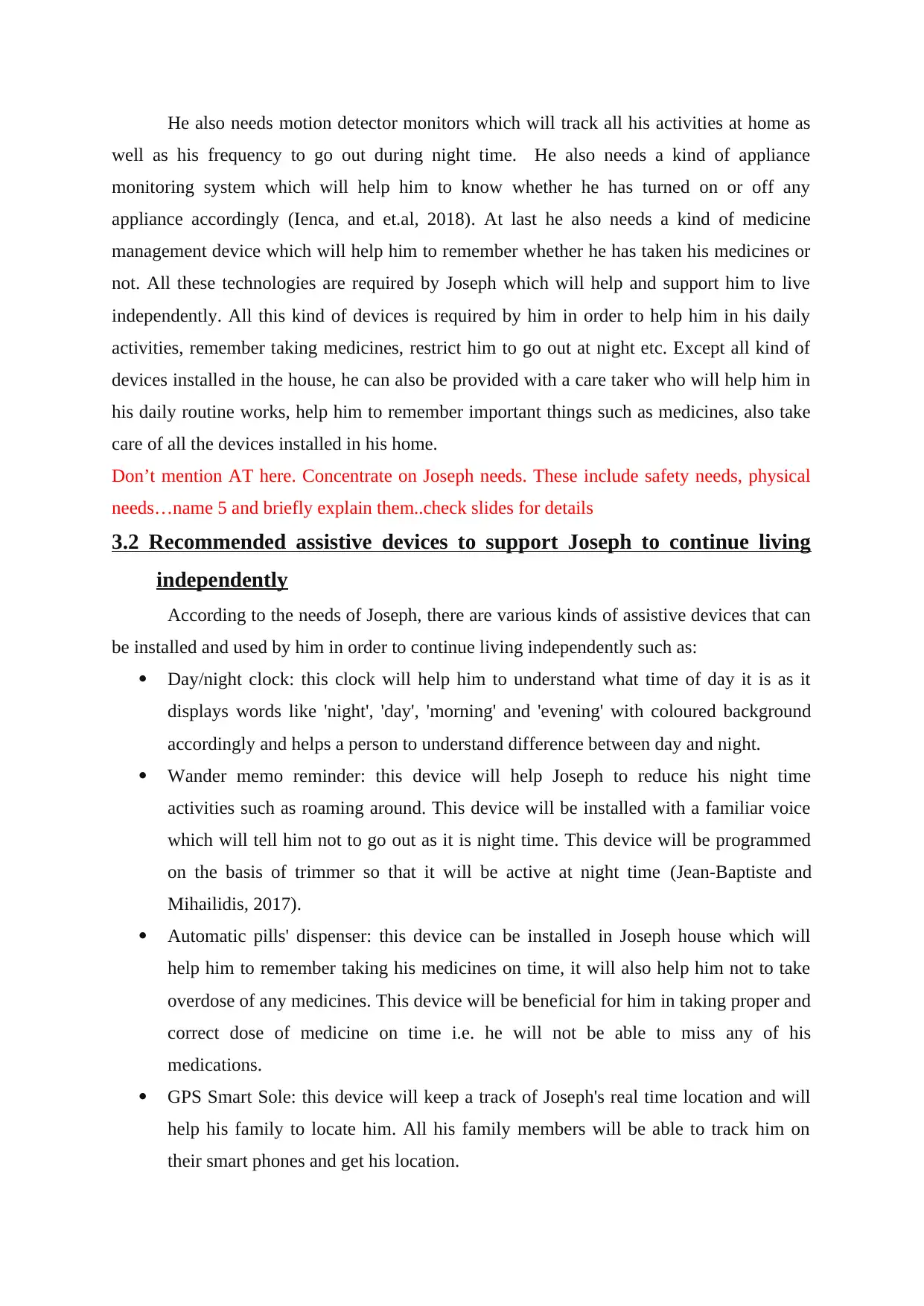
He also needs motion detector monitors which will track all his activities at home as
well as his frequency to go out during night time. He also needs a kind of appliance
monitoring system which will help him to know whether he has turned on or off any
appliance accordingly (Ienca, and et.al, 2018). At last he also needs a kind of medicine
management device which will help him to remember whether he has taken his medicines or
not. All these technologies are required by Joseph which will help and support him to live
independently. All this kind of devices is required by him in order to help him in his daily
activities, remember taking medicines, restrict him to go out at night etc. Except all kind of
devices installed in the house, he can also be provided with a care taker who will help him in
his daily routine works, help him to remember important things such as medicines, also take
care of all the devices installed in his home.
Don’t mention AT here. Concentrate on Joseph needs. These include safety needs, physical
needs…name 5 and briefly explain them..check slides for details
3.2 Recommended assistive devices to support Joseph to continue living
independently
According to the needs of Joseph, there are various kinds of assistive devices that can
be installed and used by him in order to continue living independently such as:
Day/night clock: this clock will help him to understand what time of day it is as it
displays words like 'night', 'day', 'morning' and 'evening' with coloured background
accordingly and helps a person to understand difference between day and night.
Wander memo reminder: this device will help Joseph to reduce his night time
activities such as roaming around. This device will be installed with a familiar voice
which will tell him not to go out as it is night time. This device will be programmed
on the basis of trimmer so that it will be active at night time (Jean-Baptiste and
Mihailidis, 2017).
Automatic pills' dispenser: this device can be installed in Joseph house which will
help him to remember taking his medicines on time, it will also help him not to take
overdose of any medicines. This device will be beneficial for him in taking proper and
correct dose of medicine on time i.e. he will not be able to miss any of his
medications.
GPS Smart Sole: this device will keep a track of Joseph's real time location and will
help his family to locate him. All his family members will be able to track him on
their smart phones and get his location.
well as his frequency to go out during night time. He also needs a kind of appliance
monitoring system which will help him to know whether he has turned on or off any
appliance accordingly (Ienca, and et.al, 2018). At last he also needs a kind of medicine
management device which will help him to remember whether he has taken his medicines or
not. All these technologies are required by Joseph which will help and support him to live
independently. All this kind of devices is required by him in order to help him in his daily
activities, remember taking medicines, restrict him to go out at night etc. Except all kind of
devices installed in the house, he can also be provided with a care taker who will help him in
his daily routine works, help him to remember important things such as medicines, also take
care of all the devices installed in his home.
Don’t mention AT here. Concentrate on Joseph needs. These include safety needs, physical
needs…name 5 and briefly explain them..check slides for details
3.2 Recommended assistive devices to support Joseph to continue living
independently
According to the needs of Joseph, there are various kinds of assistive devices that can
be installed and used by him in order to continue living independently such as:
Day/night clock: this clock will help him to understand what time of day it is as it
displays words like 'night', 'day', 'morning' and 'evening' with coloured background
accordingly and helps a person to understand difference between day and night.
Wander memo reminder: this device will help Joseph to reduce his night time
activities such as roaming around. This device will be installed with a familiar voice
which will tell him not to go out as it is night time. This device will be programmed
on the basis of trimmer so that it will be active at night time (Jean-Baptiste and
Mihailidis, 2017).
Automatic pills' dispenser: this device can be installed in Joseph house which will
help him to remember taking his medicines on time, it will also help him not to take
overdose of any medicines. This device will be beneficial for him in taking proper and
correct dose of medicine on time i.e. he will not be able to miss any of his
medications.
GPS Smart Sole: this device will keep a track of Joseph's real time location and will
help his family to locate him. All his family members will be able to track him on
their smart phones and get his location.
⊘ This is a preview!⊘
Do you want full access?
Subscribe today to unlock all pages.

Trusted by 1+ million students worldwide
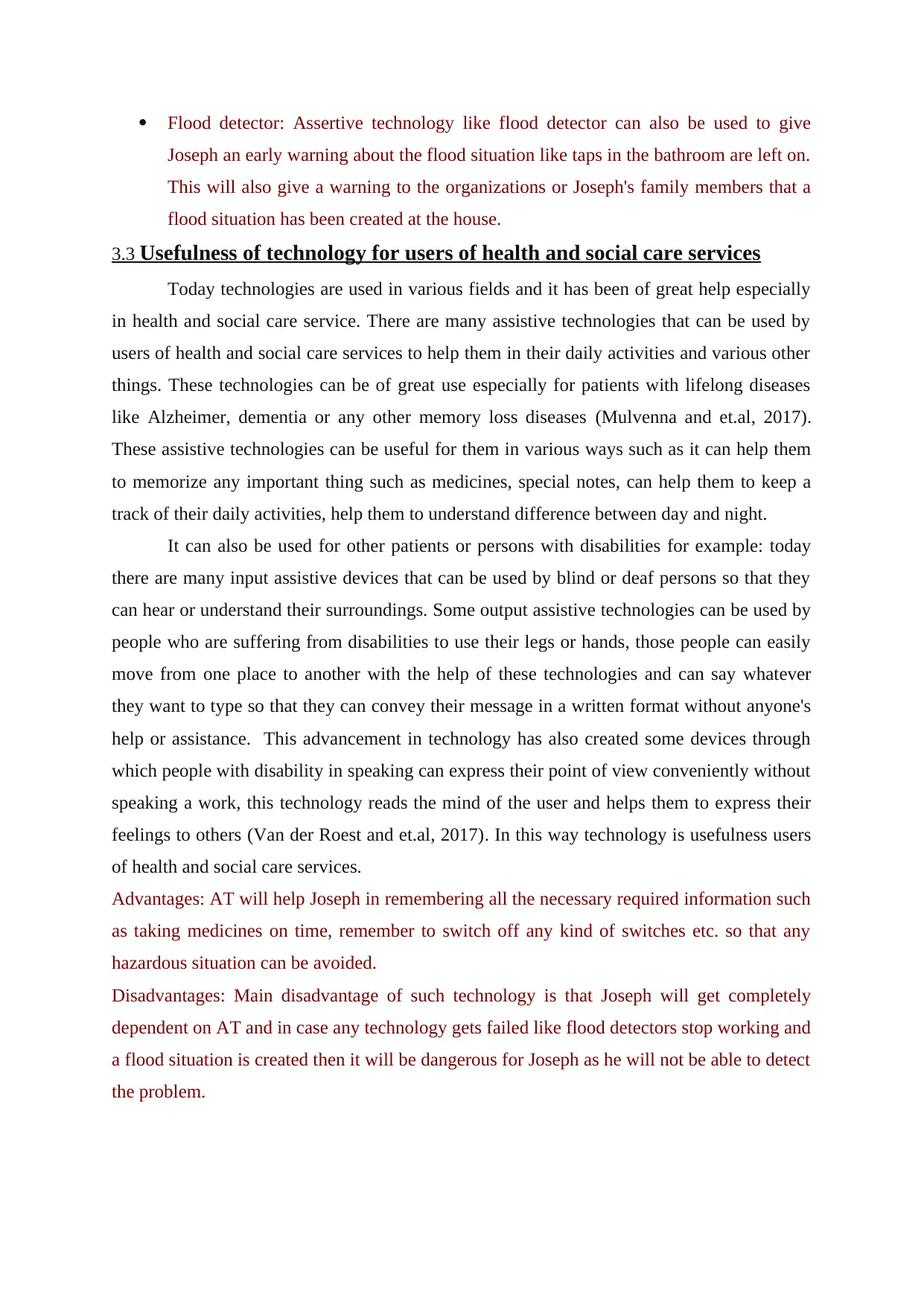
Flood detector: Assertive technology like flood detector can also be used to give
Joseph an early warning about the flood situation like taps in the bathroom are left on.
This will also give a warning to the organizations or Joseph's family members that a
flood situation has been created at the house.
3.3 Usefulness of technology for users of health and social care services
Today technologies are used in various fields and it has been of great help especially
in health and social care service. There are many assistive technologies that can be used by
users of health and social care services to help them in their daily activities and various other
things. These technologies can be of great use especially for patients with lifelong diseases
like Alzheimer, dementia or any other memory loss diseases (Mulvenna and et.al, 2017).
These assistive technologies can be useful for them in various ways such as it can help them
to memorize any important thing such as medicines, special notes, can help them to keep a
track of their daily activities, help them to understand difference between day and night.
It can also be used for other patients or persons with disabilities for example: today
there are many input assistive devices that can be used by blind or deaf persons so that they
can hear or understand their surroundings. Some output assistive technologies can be used by
people who are suffering from disabilities to use their legs or hands, those people can easily
move from one place to another with the help of these technologies and can say whatever
they want to type so that they can convey their message in a written format without anyone's
help or assistance. This advancement in technology has also created some devices through
which people with disability in speaking can express their point of view conveniently without
speaking a work, this technology reads the mind of the user and helps them to express their
feelings to others (Van der Roest and et.al, 2017). In this way technology is usefulness users
of health and social care services.
Advantages: AT will help Joseph in remembering all the necessary required information such
as taking medicines on time, remember to switch off any kind of switches etc. so that any
hazardous situation can be avoided.
Disadvantages: Main disadvantage of such technology is that Joseph will get completely
dependent on AT and in case any technology gets failed like flood detectors stop working and
a flood situation is created then it will be dangerous for Joseph as he will not be able to detect
the problem.
Joseph an early warning about the flood situation like taps in the bathroom are left on.
This will also give a warning to the organizations or Joseph's family members that a
flood situation has been created at the house.
3.3 Usefulness of technology for users of health and social care services
Today technologies are used in various fields and it has been of great help especially
in health and social care service. There are many assistive technologies that can be used by
users of health and social care services to help them in their daily activities and various other
things. These technologies can be of great use especially for patients with lifelong diseases
like Alzheimer, dementia or any other memory loss diseases (Mulvenna and et.al, 2017).
These assistive technologies can be useful for them in various ways such as it can help them
to memorize any important thing such as medicines, special notes, can help them to keep a
track of their daily activities, help them to understand difference between day and night.
It can also be used for other patients or persons with disabilities for example: today
there are many input assistive devices that can be used by blind or deaf persons so that they
can hear or understand their surroundings. Some output assistive technologies can be used by
people who are suffering from disabilities to use their legs or hands, those people can easily
move from one place to another with the help of these technologies and can say whatever
they want to type so that they can convey their message in a written format without anyone's
help or assistance. This advancement in technology has also created some devices through
which people with disability in speaking can express their point of view conveniently without
speaking a work, this technology reads the mind of the user and helps them to express their
feelings to others (Van der Roest and et.al, 2017). In this way technology is usefulness users
of health and social care services.
Advantages: AT will help Joseph in remembering all the necessary required information such
as taking medicines on time, remember to switch off any kind of switches etc. so that any
hazardous situation can be avoided.
Disadvantages: Main disadvantage of such technology is that Joseph will get completely
dependent on AT and in case any technology gets failed like flood detectors stop working and
a flood situation is created then it will be dangerous for Joseph as he will not be able to detect
the problem.
Paraphrase This Document
Need a fresh take? Get an instant paraphrase of this document with our AI Paraphraser
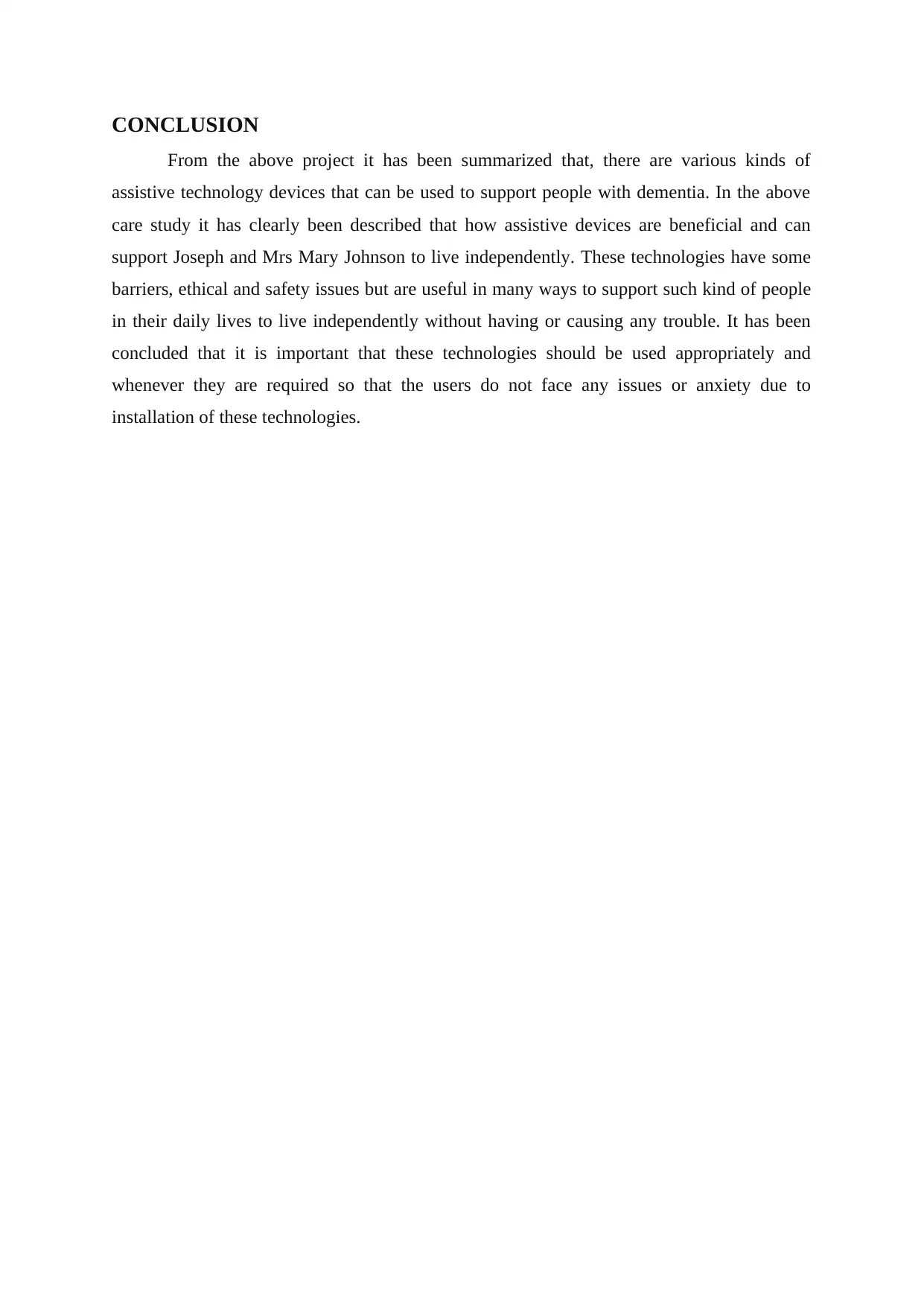
CONCLUSION
From the above project it has been summarized that, there are various kinds of
assistive technology devices that can be used to support people with dementia. In the above
care study it has clearly been described that how assistive devices are beneficial and can
support Joseph and Mrs Mary Johnson to live independently. These technologies have some
barriers, ethical and safety issues but are useful in many ways to support such kind of people
in their daily lives to live independently without having or causing any trouble. It has been
concluded that it is important that these technologies should be used appropriately and
whenever they are required so that the users do not face any issues or anxiety due to
installation of these technologies.
From the above project it has been summarized that, there are various kinds of
assistive technology devices that can be used to support people with dementia. In the above
care study it has clearly been described that how assistive devices are beneficial and can
support Joseph and Mrs Mary Johnson to live independently. These technologies have some
barriers, ethical and safety issues but are useful in many ways to support such kind of people
in their daily lives to live independently without having or causing any trouble. It has been
concluded that it is important that these technologies should be used appropriately and
whenever they are required so that the users do not face any issues or anxiety due to
installation of these technologies.
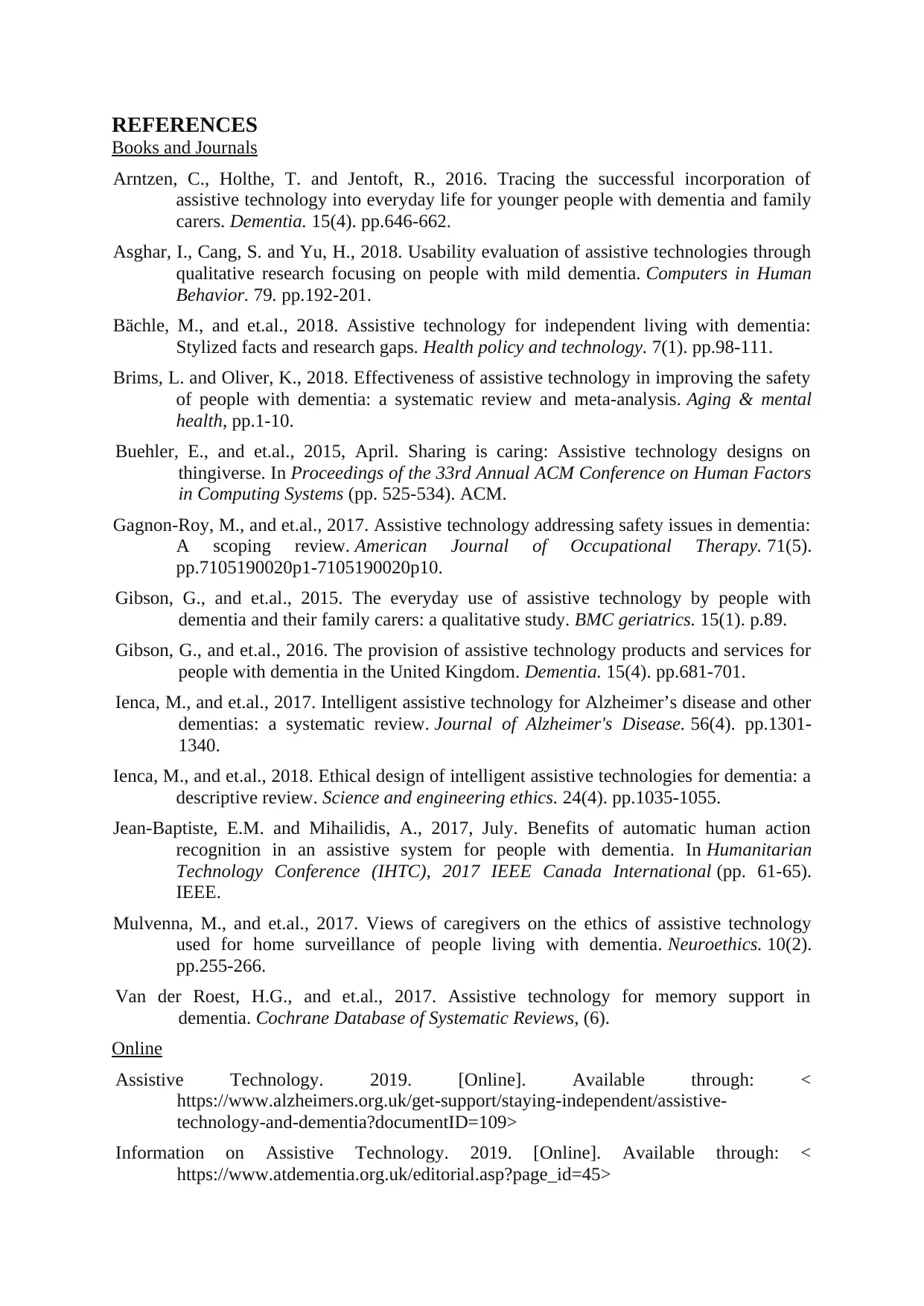
REFERENCES
Books and Journals
Arntzen, C., Holthe, T. and Jentoft, R., 2016. Tracing the successful incorporation of
assistive technology into everyday life for younger people with dementia and family
carers. Dementia. 15(4). pp.646-662.
Asghar, I., Cang, S. and Yu, H., 2018. Usability evaluation of assistive technologies through
qualitative research focusing on people with mild dementia. Computers in Human
Behavior. 79. pp.192-201.
Bächle, M., and et.al., 2018. Assistive technology for independent living with dementia:
Stylized facts and research gaps. Health policy and technology. 7(1). pp.98-111.
Brims, L. and Oliver, K., 2018. Effectiveness of assistive technology in improving the safety
of people with dementia: a systematic review and meta-analysis. Aging & mental
health, pp.1-10.
Buehler, E., and et.al., 2015, April. Sharing is caring: Assistive technology designs on
thingiverse. In Proceedings of the 33rd Annual ACM Conference on Human Factors
in Computing Systems (pp. 525-534). ACM.
Gagnon-Roy, M., and et.al., 2017. Assistive technology addressing safety issues in dementia:
A scoping review. American Journal of Occupational Therapy. 71(5).
pp.7105190020p1-7105190020p10.
Gibson, G., and et.al., 2015. The everyday use of assistive technology by people with
dementia and their family carers: a qualitative study. BMC geriatrics. 15(1). p.89.
Gibson, G., and et.al., 2016. The provision of assistive technology products and services for
people with dementia in the United Kingdom. Dementia. 15(4). pp.681-701.
Ienca, M., and et.al., 2017. Intelligent assistive technology for Alzheimer’s disease and other
dementias: a systematic review. Journal of Alzheimer's Disease. 56(4). pp.1301-
1340.
Ienca, M., and et.al., 2018. Ethical design of intelligent assistive technologies for dementia: a
descriptive review. Science and engineering ethics. 24(4). pp.1035-1055.
Jean-Baptiste, E.M. and Mihailidis, A., 2017, July. Benefits of automatic human action
recognition in an assistive system for people with dementia. In Humanitarian
Technology Conference (IHTC), 2017 IEEE Canada International (pp. 61-65).
IEEE.
Mulvenna, M., and et.al., 2017. Views of caregivers on the ethics of assistive technology
used for home surveillance of people living with dementia. Neuroethics. 10(2).
pp.255-266.
Van der Roest, H.G., and et.al., 2017. Assistive technology for memory support in
dementia. Cochrane Database of Systematic Reviews, (6).
Online
Assistive Technology. 2019. [Online]. Available through: <
https://www.alzheimers.org.uk/get-support/staying-independent/assistive-
technology-and-dementia?documentID=109>
Information on Assistive Technology. 2019. [Online]. Available through: <
https://www.atdementia.org.uk/editorial.asp?page_id=45>
Books and Journals
Arntzen, C., Holthe, T. and Jentoft, R., 2016. Tracing the successful incorporation of
assistive technology into everyday life for younger people with dementia and family
carers. Dementia. 15(4). pp.646-662.
Asghar, I., Cang, S. and Yu, H., 2018. Usability evaluation of assistive technologies through
qualitative research focusing on people with mild dementia. Computers in Human
Behavior. 79. pp.192-201.
Bächle, M., and et.al., 2018. Assistive technology for independent living with dementia:
Stylized facts and research gaps. Health policy and technology. 7(1). pp.98-111.
Brims, L. and Oliver, K., 2018. Effectiveness of assistive technology in improving the safety
of people with dementia: a systematic review and meta-analysis. Aging & mental
health, pp.1-10.
Buehler, E., and et.al., 2015, April. Sharing is caring: Assistive technology designs on
thingiverse. In Proceedings of the 33rd Annual ACM Conference on Human Factors
in Computing Systems (pp. 525-534). ACM.
Gagnon-Roy, M., and et.al., 2017. Assistive technology addressing safety issues in dementia:
A scoping review. American Journal of Occupational Therapy. 71(5).
pp.7105190020p1-7105190020p10.
Gibson, G., and et.al., 2015. The everyday use of assistive technology by people with
dementia and their family carers: a qualitative study. BMC geriatrics. 15(1). p.89.
Gibson, G., and et.al., 2016. The provision of assistive technology products and services for
people with dementia in the United Kingdom. Dementia. 15(4). pp.681-701.
Ienca, M., and et.al., 2017. Intelligent assistive technology for Alzheimer’s disease and other
dementias: a systematic review. Journal of Alzheimer's Disease. 56(4). pp.1301-
1340.
Ienca, M., and et.al., 2018. Ethical design of intelligent assistive technologies for dementia: a
descriptive review. Science and engineering ethics. 24(4). pp.1035-1055.
Jean-Baptiste, E.M. and Mihailidis, A., 2017, July. Benefits of automatic human action
recognition in an assistive system for people with dementia. In Humanitarian
Technology Conference (IHTC), 2017 IEEE Canada International (pp. 61-65).
IEEE.
Mulvenna, M., and et.al., 2017. Views of caregivers on the ethics of assistive technology
used for home surveillance of people living with dementia. Neuroethics. 10(2).
pp.255-266.
Van der Roest, H.G., and et.al., 2017. Assistive technology for memory support in
dementia. Cochrane Database of Systematic Reviews, (6).
Online
Assistive Technology. 2019. [Online]. Available through: <
https://www.alzheimers.org.uk/get-support/staying-independent/assistive-
technology-and-dementia?documentID=109>
Information on Assistive Technology. 2019. [Online]. Available through: <
https://www.atdementia.org.uk/editorial.asp?page_id=45>
⊘ This is a preview!⊘
Do you want full access?
Subscribe today to unlock all pages.

Trusted by 1+ million students worldwide
1 out of 13
Related Documents
Your All-in-One AI-Powered Toolkit for Academic Success.
+13062052269
info@desklib.com
Available 24*7 on WhatsApp / Email
![[object Object]](/_next/static/media/star-bottom.7253800d.svg)
Unlock your academic potential
Copyright © 2020–2026 A2Z Services. All Rights Reserved. Developed and managed by ZUCOL.




